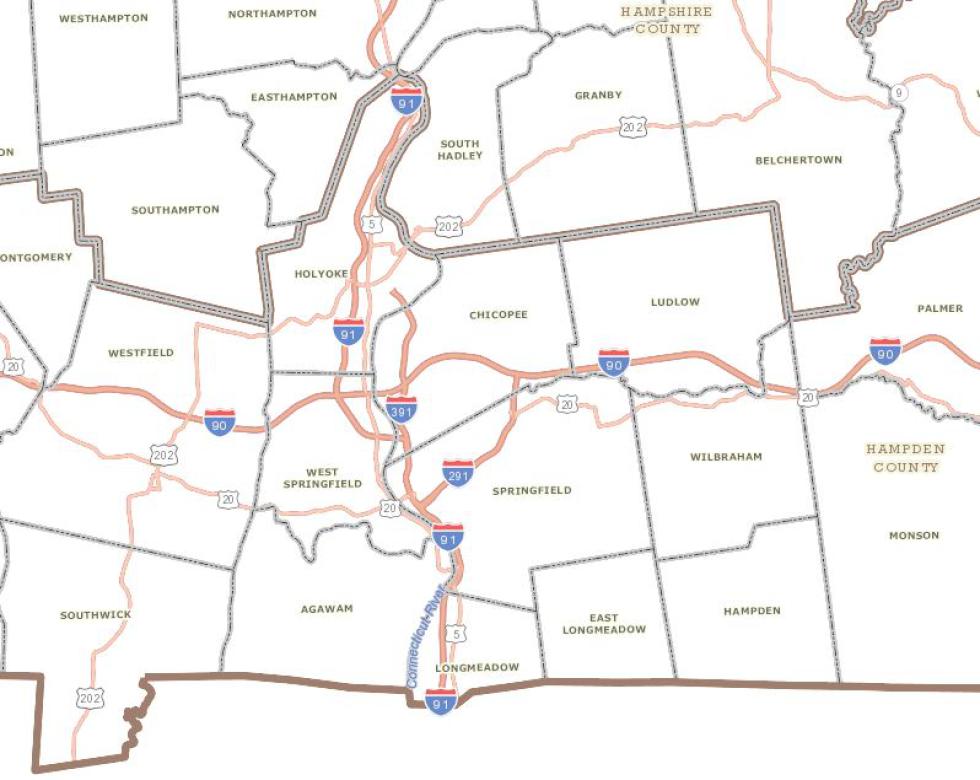The site of the Springfield casino won’t look like anything much until 2015, but eight neighboring communities saw a tangible advance this past Friday in the form of cold hard cash.
MGM distributed nearly $2 million to nearby communities as the first installment in a multiyear plan to offset the casino’s economic impact on area services, transportation and local businesses. The money goes to towns and cities that successfully applied to the Massachusetts Gaming Commission for “surrounding community” status. Once the status was granted, each community negotiated compensation agreements with MGM — a requirement under the Expanded Gaming Act of 2011. In addition to this first round of payments, the eight surrounding communities will receive set annual payments through the span of the casino’s 15-year license.
But Agawam Mayor Richard Cohen cautions against magical thinking. MGM’s upfront payments to the city of Springfield will total about $15 million by 2017, and that’s not too bad — for Springfield.
“I hear from some people who think that everyone’s going to get rich off the casino. But the only community that gets substantial funding is the host community,” Cohen said. “The surrounding communities aren’t going to get rich off of this.”
The initial payments vary, but how some communities will use the money remains to be seen.
Longmeadow: On Friday, MGM paid the town of Longmeadow $850,000, with payments of $275,000 annually for 13 years after the casino opens — a total of nearly $4.5 million. Stephen Crane, town manager, said that since 2011 his town has spent $145,000 researching potential impacts of the casino, some of which was reimbursed by MGM. Crane said the town looked at everything from expanding public schools to hiring additional health and building inspectors. Longmeadow’s decision: focus on improvements to traffic-flow, road conditions, and public safety.
Crane added that the traffic lights are old. “If you’re sitting in a car up near the traffic light, and the light turns green, you can hear it go ‘clunk.’”
West Springfield: Mayor Edward Sullivan has also prioritized traffic. He said West Springfield will use the $665,000 it just got from MGM to redesign the crumbling Memorial Avenue corridor. He added that the section of road from Memorial Bridge over to Union Street is in most critical condition and will need to be addressed first.
“It’s one of the main entryways to the casino from the west,” he said. “We’re definitely going to have some increased traffic.”
The city is also looking to put together a baseline traffic study to see how the Interstate 91 viaduct rebuild will divert traffic into West Springfield. “That in turn will push some of our local traffic further onto Union Street and Main Street corridors,” he said.
West Springfield will also receive annual payments of $375,000 from MGM. A portion of the money will offset West Springfield’s legal fees and consulting costs.
“It’s almost like going through a divorce and having to pay for your spouse’s lawyer,” Sullivan said. “But that’s the way it works.”
The city is also considering an increase in police presence to help counter any rise in the crime rate.
Agawam: Mayor Cohen said his city isn’t going to rush into spending its casino money: $125,000 upfront and $150,000 annually. Cohen will sit down with department heads for deeper discussions now that the money is arriving. But for his part he’d like to see some of the money go toward the senior center as well as public safety and youth leagues.
“We’re very connected to Springfield. Traffic will go right through here. So we’ll have to use this money in ways that benefit everybody.” he said.
East Longmeadow, Wilbraham, and Ludlow: These smaller towns are saving their money for now and plan to address negative impacts as they arise.
“We’re just going to hang onto it for now,” said Paul Federici, East Longmeadow’s select board clerk. Officials will decide how to spend the money by committee.
All three towns received $50,000 each on Friday, with $75,000 coming in annually.
“We figured we’d take it rather than fight it and risk getting less. One hundred percent of something is better than nothing,” Federici said.
In Wilbraham, Interim Town Administrator Tom Sullivan said the town already spent $33,000 of its upfront $50,000 on legal fees during negotiations. It has about $16,500 left.
“We’ll vote at town meeting about appropriating it. For now it will go into our free cash for next year.”
The same thing will happen in Ludlow, said Aaron Saunders, a member of the town’s select board. Saunders said that while the money’s uses aren’t yet determined, it may end up being spent on law enforcement, including technology that will allow for improved response times from police and faster communication between officers across town borders.
“That just seems like a no-brainer. This $50,000 upfront from the casino isn’t going to completely pay for that, but that’s where I’d like to see it go,” he said.
Chicopee and Holyoke: Chicopee will receive $125,000 upfront with annual payments of $100,000. This initial agreement is still subject to the city’s review, said Chicopee Mayor Richard Kos. “We’ll most likely utilize this money to hire consultants to make a more accurate measurement of the casino’s impact.”
Holyoke will receive $50,000 upfront and minimum annual payments of $85,000. In addition, MGM has agreed to a pledge requested by Holyoke Mayor Alex Morse that the company give priority to Holyoke residents when hiring for casino jobs.
Annual payments will begin once the casino opens in 2017. MGM also plans to conduct one-year and five-year “look back” studies in 2018 and 2022 on the casino’s economic impact. The company has encouraged the surrounding communities to conduct their own one-year and five-year mitigation assessments to compare with MGM’s findings.•
Contact Hunter Styles at hstyles@valleyadvocate.com.



